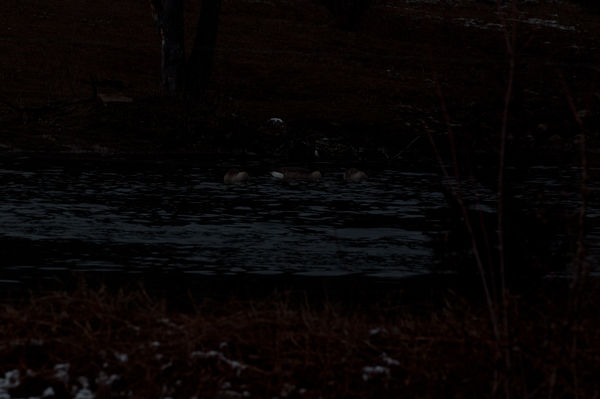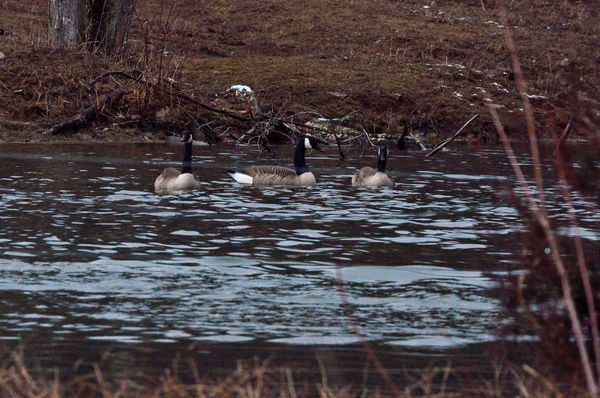Help with polorizing filter
Feb 7, 2012 06:40:52 #
I used a polarizing filter for the first time - for photos in the snow. I have a Nikon D500, and a Nikon 70-200 VRII lens. I set the ISO at 400 since it was very overcast, and used a fast time since I was shooting animals, and in this case could not use a tripod (could not set it up without alarming the birds). I used the internal light meeter to set the aperture. I checked some of the photos as I took them and they appeared OK on the monitor screen. When I looked at them in lightroom 3 they were very dark. I was able to lighten them some, but lost a lot of detail. I took other photos at a variety of speeds and apertures, but all were dark like this one
My questions is, do I need to under expose when using the filter? I thought the internal light meter would adjust for the filter? Did I do something incorrect? I am new to DSLR, always used it on auto before, but trying to learn to do my own settings.
My questions is, do I need to under expose when using the filter? I thought the internal light meter would adjust for the filter? Did I do something incorrect? I am new to DSLR, always used it on auto before, but trying to learn to do my own settings.
as shot

after PP

Feb 7, 2012 06:47:45 #
You should always do a proper exposure and just because the LCD looks ok doesn't meant that the shot is properly exposed...you can get more info from your histogram.
That shot is definitely underexposed...something went wrong.
What did your meter in the camera say when you took this? There are no really light or dark colors so I can't believe it was fooled THAT much?
That shot is definitely underexposed...something went wrong.
What did your meter in the camera say when you took this? There are no really light or dark colors so I can't believe it was fooled THAT much?
Feb 7, 2012 07:08:02 #
I would go look at your metadata. I tried but it was striped. I think you have something set in the camera wrong. Don't see how it could miss it that bad.
Erv
Erv
Feb 7, 2012 09:17:27 #
Check and see if you have a LINEAR or CIRCULAR Polarizer. The Circular is what you need, it will sai CIRP or CP or something similar. The LINEAR will ruin your shot most of the time as the exposure meter and AF sensor will usually not work properly with it, the will just say POL or POLARIZER on them.
Feb 7, 2012 09:56:57 #
docrob
Loc: Durango, Colorado
Sala wrote:
I used a polarizing filter for the first time - fo... (show quote)
well no you should not underexpose per se or over expose per se when using a polarizer filter.......but you should check your meter settings and make sure its a circular polarizer.
Feb 7, 2012 10:11:09 #
Feb 7, 2012 10:24:01 #
docrob
Loc: Durango, Colorado
rpavich wrote:
did you meter for this shot and THEN put the filter on the lens?
ohhhh good question
Feb 7, 2012 10:55:47 #
Never seen a polarizing do what it did here. I have seen cameras having difficulties to focus due to the filter but that's it.
I suspect that you have made a mistake when exposing. The PP result with this is surprising.
I suspect that you have made a mistake when exposing. The PP result with this is surprising.
Feb 8, 2012 08:54:25 #
Feb 8, 2012 11:00:24 #
Greg
Loc: Maryland
MT Shooter wrote:
Check and see if you have a LINEAR or CIRCULAR Polarizer. The Circular is what you need, it will sai CIRP or CP or something similar. The LINEAR will ruin your shot most of the time as the exposure meter and AF sensor will usually not work properly with it, the will just say POL or POLARIZER on them.
I shoot with a linear all the time. That would not explain these results. Linear doesn't really mess with your metering, it messes up your auto focus.
Feb 8, 2012 11:16:28 #
Greg wrote:
I shoot with a linear all the time. That would not explain these results. Linear doesn't really mess with your metering, it messes up your auto focus.
MT Shooter wrote:
Check and see if you have a LINEAR or CIRCULAR Polarizer. The Circular is what you need, it will sai CIRP or CP or something similar. The LINEAR will ruin your shot most of the time as the exposure meter and AF sensor will usually not work properly with it, the will just say POL or POLARIZER on them.
I shoot with a linear all the time. That would not explain these results. Linear doesn't really mess with your metering, it messes up your auto focus.
That actually depends on the camera. I use a linear on my F5 with no trouble at all in manual focus. But I did try it on my D50 with very similar results to the OPs pics.
Here is a study result as to why:
http://www.luminous-landscape.com/tutorials/polarizers.shtml
Feb 8, 2012 20:25:19 #
In the past I used a linear polorizer on a digital and never experianced that much difference. The only type that could black out a couple stops is a variable polorizer or two polorizers stacked!
When covering an air show, I use a variable polorizer on my binoculars to follow distant planes/jets flying around the sun. Variable filters black out just about everything if you set them to where as a normal tele on a camera would blind you or worse!
*** Never look at the sun with your camera unless you have a proper filter made for doing it! ***
This may not be the problem but have you looked at the meter's EV setting? If you have ever changed it and forgot to switch back, that could be the problem. *(Voice of experiance speaking! LoL)
When covering an air show, I use a variable polorizer on my binoculars to follow distant planes/jets flying around the sun. Variable filters black out just about everything if you set them to where as a normal tele on a camera would blind you or worse!
*** Never look at the sun with your camera unless you have a proper filter made for doing it! ***
This may not be the problem but have you looked at the meter's EV setting? If you have ever changed it and forgot to switch back, that could be the problem. *(Voice of experiance speaking! LoL)
Feb 8, 2012 20:50:41 #
If you would post your first picture "as shot"
with the download set we could see the data and help to figure out the under exposure. Thanks David in Florida.
with the download set we could see the data and help to figure out the under exposure. Thanks David in Florida.
Feb 10, 2012 16:57:01 #
What does your histogram look like, it will not lie about the exposure. Also, shoot in RAW, the ability of lightroom to bring back an underexposed image is amazing. Just use fill light and tonal correction curves (the dark slider).
Feb 16, 2012 19:34:46 #
I would like to see the histogram and would recommend you use the histogram setting on your camera.
If you want to reply, then register here. Registration is free and your account is created instantly, so you can post right away.








